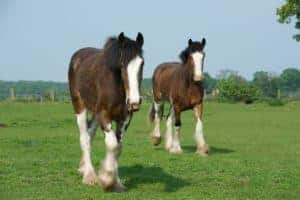Lawsonia Prevalence Patterns Investigated
Yearly variability in exposure to a severe disease-causing bacterium of young horses appears to be different than previously thought. Despite the common belief that the incidence of equine proliferative enteropathy (EPE), a severe gastrointestinal disease of foals and long yearlings, spikes higher in some years than in others, researchers have recently found that perception might not reflect reality.
EPE is caused by Lawsonia intracellularis, a Gram-negative bacterium. The condition appears seasonally in Central Kentucky with spikes of cases in October and November and in January and February. At the 2012 American Association of Equine Practitioners Convention, held Dec. 1-5 in Anaheim, Calif., Allen Page, DVM, of the University of Kentucky’s Gluck Equine Research Center, presented a retrospective study on the “Incidence of Yearly Lawsonia intracellularis Assay Variations from Horses in Kentucky.”
He compiled fecal and post-mortem (necropsy) polymerase chain reaction (PCR, a type of DNA test) results and serum immunoperoxidase monolayer assay results from cases across Kentucky logged from July1, 2002, to June 30, 2010. He and his colleagues also reviewed enzyme-linked immunosorbent assay (ELISA) test results of weanlings from three farms where EPE is endemic.
According to Page, veterinarians and scientist haven’t confirmed how horses contract L. intracellularis, but they think it is likely through ingesting contaminated feces. While post-mortem examination is the gold standard for diagnosing EPE, the fecal PCR test is highly specific; this means that a positive result has a high correlation with infection. However, the PCR is not as sensitive, meaning that some PCR-negative horses might still be infected. Researchers also believe infected horses shed the organism intermittently in feces, so it might be missed with one-time testing. Some at-risk horses without clinical signs were positive on serological assay, meaning that the horses had likely been exposed to L. intracellularis but did not develop clinical EPE
Create a free account with TheHorse.com to view this content.
TheHorse.com is home to thousands of free articles about horse health care. In order to access some of our exclusive free content, you must be signed into TheHorse.com.
Start your free account today!
Already have an account?
and continue reading.
Related Articles
Stay on top of the most recent Horse Health news with

















